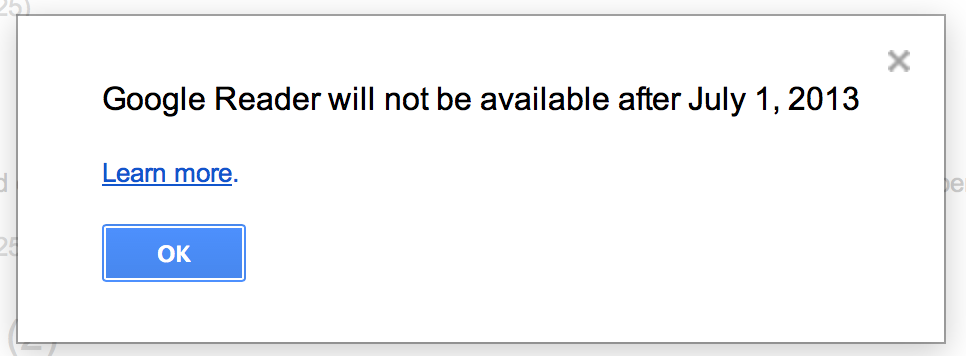Direst news! Google is turning off its Google Reader service on 1 July, eight years after its birth.
Of course, if you are in what is apparently the vast majority of the population, you either haven’t heard of Google Reader, haven’t used it, or haven’t logged in for years. The company cites declining usage of the service as a reason for its retirement, and they probably aren’t making that up: the idea of reading the web by subscribing to RSS feeds through an dedicated app, once posited as the future of publishing, never hit the widespread usage it was expected to.
And if you do use the service, it probably isn’t news that it’s shutting either—because you’ve probably already logged in, this morning or last night, to be greeted with the dialogue box of doom:

If you are anything like me, and apparently most of my Twitter followers, you have already got your panicking out of the way. Now the dreadful thought bubbles up: what happens next?
Firstly: don’t panic! (Any more than you already have.) Although Google Reader is used as a back-end service for a number of RSS apps, like Reeder and Feedly, a number of them—including those two—have confirmed that they already have plans for a replacement syncing service which should let users carry on as though Reader never shut.
If you are a die-hard user of the Reader web-app, though, you’re going to have to make the switch as some point. Come 1 July, reader.google.com will presumably shut down—or, even worse, redirect to Google+—and you’ll have to find a new way of using your feeds.
The first thing to do is nab your data out of Google Reader. The company offers its Takeaway service, which ought to make this easy to do. Just click here, and follow the steps.
Once you’ve got that far, where you go next depends on what you used the old Reader for. There’s multiple services which scratch different itches, and any one of them could be right for you.
The most obvious recommendation is The Old Reader. Exactly as it sounds, this is a clone of the old Google Reader (old in this case meaning old-old—it mimics Google Reader as it was before the company removed sharing functionality at the end of 2011). It’s still in beta, and doesn’t have a mobile app or an API, so if you transfer your data to it, you’ll need to be prepared to be in the browser a lot. But if you’re averse to change, this might be the best option.
If you’re someone who uses Google Reader as a gentle browser, then consider Flipboard. The service is designed for lean-back reading, rather than obsessive newshounds, but it does what it does exceptionally well. If you’re the sort of person who panics about not reading every post on your favourite site, it’s not for you, but if you’ve been using Google Reader to find interesting things from a few sources, it might make life more pleasant. Mobile only, though, so you’ll need to compliment it with something that has a web or desktop app.
At the exact opposite end of the spectrum is Newsblur. This is designed explicitly for obsessive newshounds; it’s fast, powerful and, though I love it, ugly as sin. It takes all your feeds in, and applies a smart filter to them to push the breakingest news to the top of your pile. If you only have fifty feeds, it might be overkill; but if you’re pushing five hundred, you’ll wonder how you lived without it.
Newsblur also has a mobile app, and the developer has a far nicer-looking UI in beta. It’s where I’m planning to move my data, and I don’t appear to be alone: by 7:30am this morning, the developer had moved from one server to six, and gone to bed for the night; as I write this, the site is down under excessive load.
Perhaps the best thing about Newsblur, though, is that it’s not free (it lets you trial it, but caps your subscription at 100 feeds until you pay). That may be an odd thing to say, but the fact is that if Google Reader hadn’t been a hobby for the company—it was staffed, in its dying days, by just five people—it may have stayed alive. We’ve all heard the clichés, that if you aren’t paying, you’re not the customer, you’re the product; but they are clichés for a reason. Assuming that it successfully scales up past this initial burst of popularity, maybe having all your data on a service with a financial motivation for keeping it is not such a bad idea?
And for the small subset of Google users for whom Reader was a lifeline, this ought to ring warning bells for the rest of the company’s services. Sure, Reader wasn’t used by many people, while Gmail is the world’s email service; but what happens if Google decides that it isn’t making enough money to justify running a free email service, and ports everyone to Google+? Will your self-driving car enter a “sunset phase” if the number of users drops below some arbitrary level eight years after you bought it?
The market for news aggregators might get a kick up the arse from the exit of a corporate behemoth which had previously been smothering all innovation with an abandoned, yet still good-enough, free product. As Gawker’s Max Read wrote, it kind of excites me, “in the same way i am excited at the prospect of navigating a postapocalyptic urban landscape”.
We might end up better after the fall, but it’s going to be a struggle to get there.






